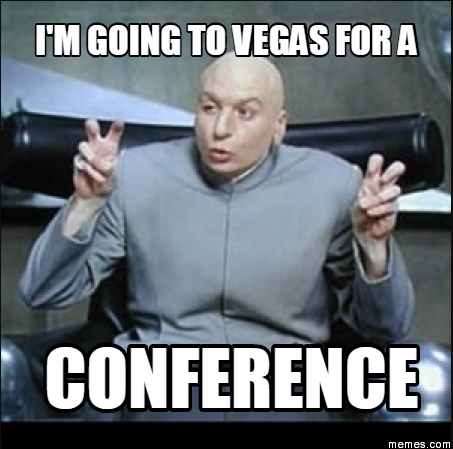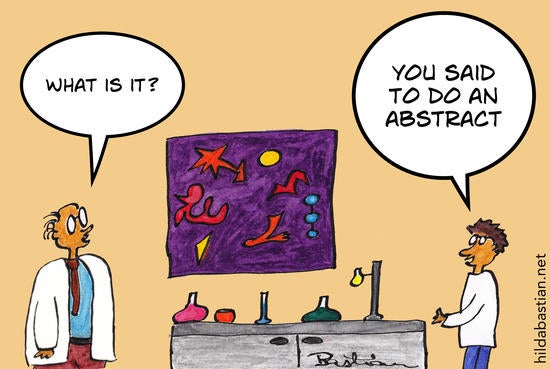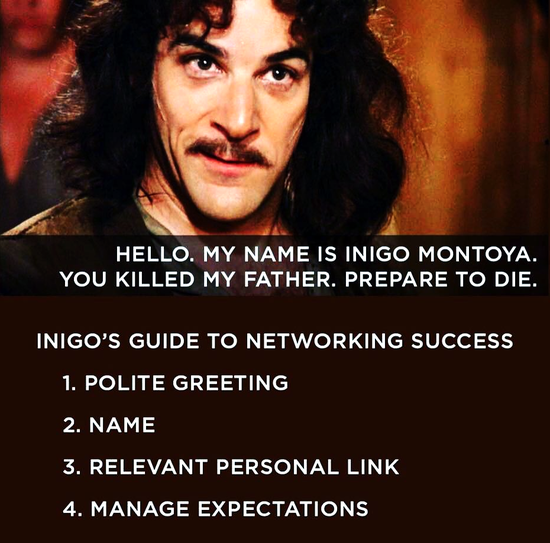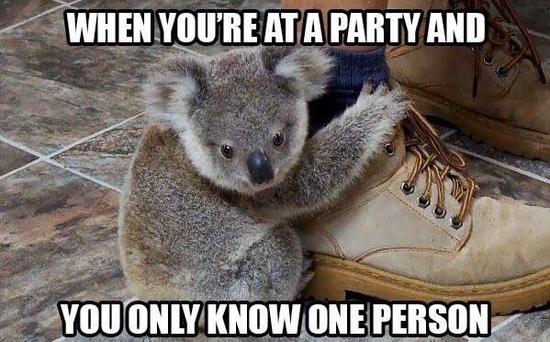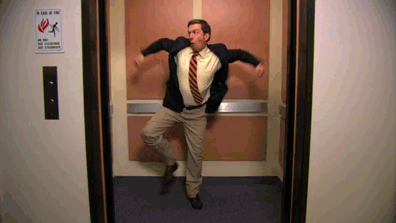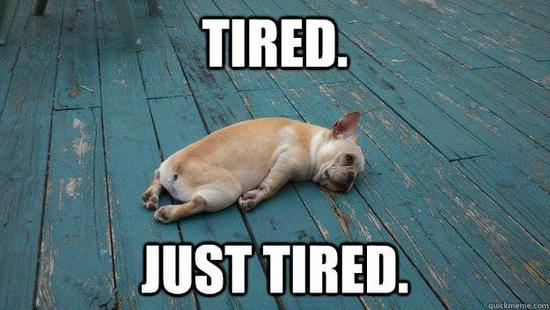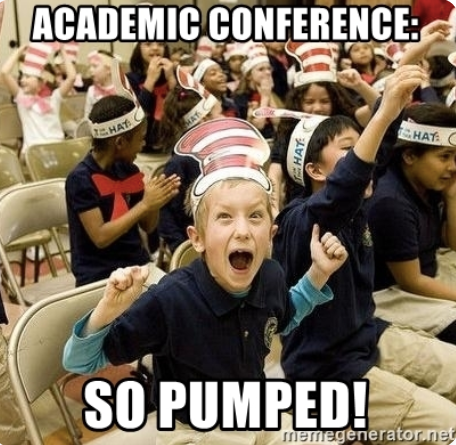Supporting Graduate Students' Academic and Professional Success
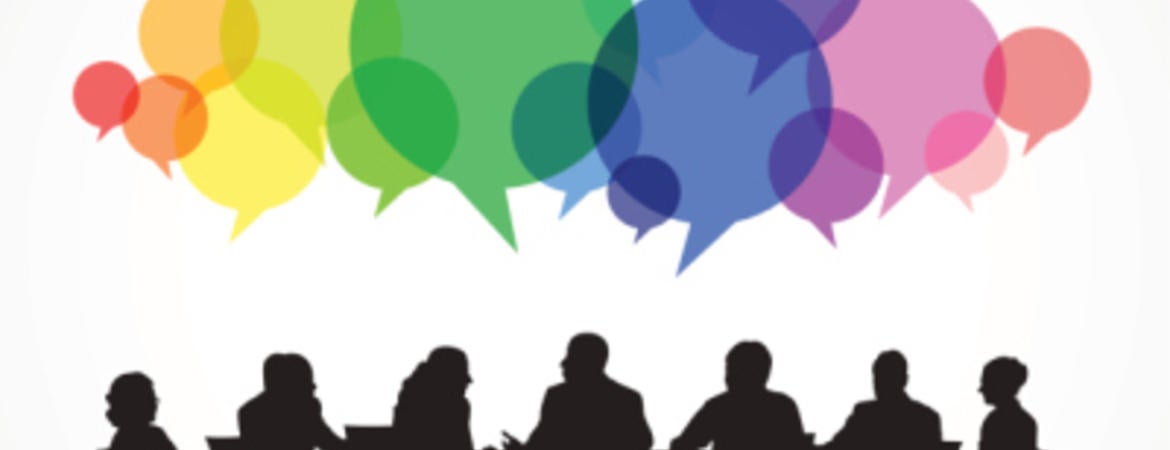
Conferences are one of the most important ways to make human connections within our fields. But getting the most out of a conference requires us to put ourselves out there in a way that can feel awkward, intimidating, and downright uncomfortable. For introverts and extroverts alike, having a conference strategy can greatly improve one’s chances of building up a solid community of colleagues.
[Image Description: Dr. Evil makes air quotes will his fingers, with the text “I’m going to Vegas for a conference”]
Pictured: Okay, so this isn’t quite what we meant
Preparing Ahead of Time
You’ll want to lay some groundwork to help you make the most out of conferences. Here are a few suggestions.
Picking your conference(s)
Ah, the obvious first step. But it’s not always so obvious which conference(s) you should attend. Your advisor, committee, and more senior graduate students in your department should be able to help. You might pick a mix of large national/international conferences and small local/regional conferences, which have different advantages and disadvantages. Since you can attend only a limited number, and many conferences require or incentivize you to commit months in advance, it’s good to start considering conferences early and often to ensure you can attend the ones that will be most helpful to your career.
| Large national or international conference | Small local or regional conference |
|---|---|
| huge diversity of research topics | fewer research topics represented |
| good chance of connecting with people at other institutions who are doing the work most relevant to your own |
people doing the work most relevant to your own may not live in your region (but if they do, it might be relatively easier to start a collaboration in the near future) |
| usually require you to set aside several days, or even a week | often only a day or two long, over a weekend |
|
may be a significant financial investment (caveat: look into funding from your department, advisor, GSA, or conference organizers to cover the cost) |
often inexpensive, especially for students |
| might be somewhat overwhelming and intimidating, especially for newer students | good opportunity to practice conferencing in a more intimate, less-intimidating setting |
Make a kick-butt presentation
If you are presenting, you’ll obviously need to prepare a talk or a poster. A visually appealing and informative talk or poster can help you really stand out from the crowd. That’s not the focus of this blog post, but many folks have put together some great resources on that topic. Here are two of my favorites.
- A very helpful presentation demonstrating basic yet powerful design principles: http://basiliskos.com/downloads
- A blog with lots of good advice for poster content and design: http://betterposters.blogspot.com/
Of course, you should get feedback from as many people as possible, and practice, practice, practice.
[Image Description: Two scientists stand next to a painting, with one scientist asking “What is it?” and the other responding “You said to do an abstract.”]
Pictured: Hopefully your pre-conference conversation with your advisor doesn’t go quite like this
Cartoon by Hilda Bastian, CC-BY-NC-ND. http://hildabastian.net
Practice introducing yourself
Whether or not you are presenting, you should practice introducing yourself. Come up with 1-2 short sentences that capture the essence of your research/academic interests. You don’t necessarily want to memorize a spiel (memorization runs a risk of making it sound unnatural or unengaging), but you should know the key points and try putting it into words a few times on different days to make sure you can muster something when needed.
Also, practice asking people about their work – social events involving your department’s seminar speakers provide a venue for this practice, as can professional development events at your university. Beyond introductions, you can practice important conversation skills like active listening (which will also help in your daily interactions!)
[Image Description: Inigo Montoya, from The Princess Bride, says: “Hello. My name is Inigo Montoya. You killed my father. Prepare to die.” Inigo’s Guide to Networking Success: 1) polite greeting; 2) name; 3) relevant personal link; 4) manage expectations.]
Pictured: Your mileage may vary
Make a game plan
If the conference makes the program available online before the conference starts, take advantage of the opportunity to plan out the events you want to attend and people you want to meet. It’s also a great idea to contact people ahead of time if you especially want to meet them – send an email to politely introduce yourself, briefly state why you are interested in talking to them, and ask if you can set a time to meet during the conference. If you feel unsure about the wording, you can always ask your advisor or a more senior grad student to check out your email draft before you send it.
Making Connections During the Conference
Time for the most rewarding, and potentially most difficult part of conferencing: making new friends and colleagues.
Especially as an early career scholar, you probably have yet to build up a network of colleagues outside your university, which can make the social aspect of conferences feel intimidating or overwhelming. But if you push the edges of your comfort zone to forge a few new connections each time you attend a conference, it starts to get easier and more fun.
Here are a few suggestions for meeting new people:
- If you see a talk you really like, find the presenter during a coffee break or poster session to compliment them and strike up a discussion (especially effective if the speaker is another student or early-career person!)
- Scope out posters early in the day, while the poster hall is empty, so that during the poster session you can bee-line to the presenters whose work most excites you
- Hang out in a well-trafficked area during coffee breaks and poster sessions, and strike up conversations with other people who seem like they could use a buddy (again, can be especially effective for connecting with fellow students and other early-career people!)
- You might spot someone you want to meet when they are already in a conversation; rather than lurk awkwardly at the periphery with a possibly-futile hope that they’ll notice you, it’s okay to walk up, make eye contact, and politely interrupt to very briefly introduce yourself and ask if the person might be able to talk at some point (“Sorry for interrupting, but I’m XX from the University of Awesome and I’ve been wanting to meet you. Is there some time you’d be free to talk?”)
- When you do have a good conversation with someone new, ask if they want to get a meal together later that day or the following day – not only will you strengthen the connection, but you will spare yourself one of those awkward “who will let me join them for lunch?” moments
- Take notes after meeting interesting people – their name, institution, a few words summarizing what they study, some other context about them, whatever; review those notes at the start of each day so that you’ll feel more comfortable approaching those people again
- Consider following up with people by email to express your enjoyment of meeting them – the email should contain context to help them remember who you are (e.g. “I really enjoyed talking to you about X at the pizza social,” “you gave me some great insight on analysis Y when we talked at the poster session”)
Don’t cling to fellow grad students in your own department – it’s okay to spend a little time enjoying their company during the conference, but if you spend too much time with them, it will prevent you from branching out (this one’s tough because it can be very tempting to stick with the familiar and easy)
[Image Description: A shy koala clings to a zookeeper’s boot, with the caption “When you’re at a party and you know only one person.”]
Pictured: Put yourself out there and meet new people – even you, introverts!
Remember that you may not have to go it alone. If your advisor, committee members, or more senior students from your department are attending the conference, they can help you meet new people! They may not realize they can assist, so you should be proactive about asking them. You can ask for help meeting specific people, or you can see if they’d facilitate general socializing.
Students sometimes prioritize seeking out the most famous people in their field. Trying to meet the superstars isn’t inherently a bad thing, but this approach has potential pitfalls, which you should work to avoid:
- First, approaching Dr. Famous the wrong way can make you come off as a starry-eyed fan when you should aim to come off as a colleague. Don’t seek them out just to give them fluffy praise, or to drone on at length about your thesis in the hopes that will make them remember you fondly; rather, approach them with topics, questions, or ideas that could generate a dialogue.
- Second, focusing all of your energy on the superstars can cause you to miss out on connecting with people at your career stage. Fellow grad students (or fellow postdocs, etc.) from other universities could be your friends and collaborators for many years to come. Invest in building that community!
Finally, let’s expand on the idea of using conferences to build a sense of community. Community requires more than ephemeral associations. To cultivate the type of relationships that underlie community, you should strive to have repeated positive interactions with a manageable number of people. Perhaps make it a goal to meet 2-3 new people at each conference who you talk to multiple times throughout that conference. Afterward, add their names to a running list of conference buddies, which you can consult before your next conference to try to meet up with those people again. Now those people can introduce you to their other conference buddies! After a couple of years, you will have half a dozen to a dozen buddies, and conferences will become exponentially more fun and rewarding.
[Image Description: Andy Bernard from The Office dances exuberantly in an elevator as the door closes.]
Pictured: You, on your way to hang out with a bunch of new conference buddies.
Pacing yourself
If you do it right, conferencing might leave you feeling pretty tired, so it’s important to pace yourself and recharge as needed.
Some tips for staving off burn-out:
- You don’t have to be in a session all the time (but don’t take that as license to miss all the talks!)
- Retreat for a couple of short breaks each day (key: keep them a reasonable length, probably on the order of ~20 minutes; if you spend all day in your hotel or alone in a coffee shop, there was no point coming to the conference)
- It’s okay to eat by yourself in your room a couple of times during the conference (but again, don’t do it too many times or you’re missing out)
- It’s okay to take half a morning or half an afternoon off at one point around the middle of the conference to enjoy a new city and hit the refresh button (bonus points if you get one or two new friends to join you!)
[Image Description: A very tired puppy lies splat on the floor]
Pictured: Yes, conferencing is hard work
A note about virtual conferences
Pandemic life has forced conferences online this past year. Although virtual reality has changed the way we currently experience conferences, and you may find that it takes a bit of creativity to pursue those human connections, much of the above advice still applies. On the bright side, virtual conferences can potentially beat in-person ones in terms of accessibility and flexibility. Organizers have used a variety of formats and put together special programs to make the most of our current situation, sometimes to great effect. Whatever the format, keep an eye out for communications from the conference organizers so that you can make the most of what they offer.
Have fun!
We attend conferences not just to learn new things and advance our careers, but also to have fun. So go forth and enjoy yourself!
[Image Description: An extremely excited kid with the caption “Academic conference: so pumped!”]
Pictured: Who can’t wait for in-person conferences to start again? I can’t wait for in-person conferences to start again!
